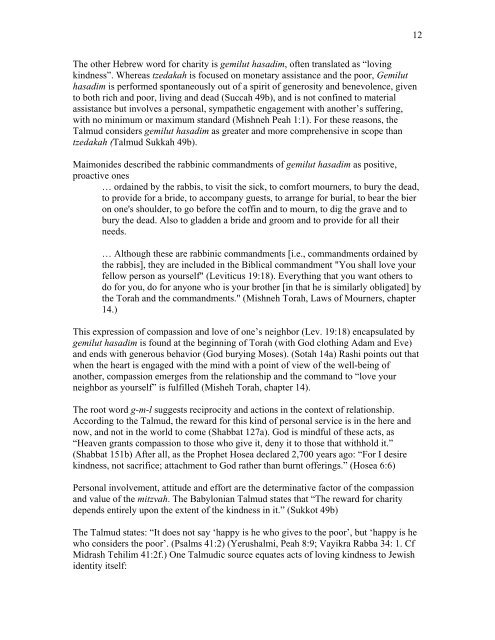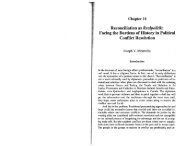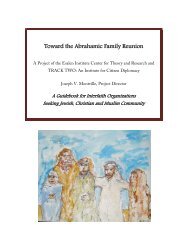The Ethics and Pro-Social Values in Judaism, Christianity and Islam ...
The Ethics and Pro-Social Values in Judaism, Christianity and Islam ...
The Ethics and Pro-Social Values in Judaism, Christianity and Islam ...
Create successful ePaper yourself
Turn your PDF publications into a flip-book with our unique Google optimized e-Paper software.
12<br />
<strong>The</strong> other Hebrew word for charity is gemilut hasadim, often translated as “lov<strong>in</strong>g<br />
k<strong>in</strong>dness”. Whereas tzedakah is focused on monetary assistance <strong>and</strong> the poor, Gemilut<br />
hasadim is performed spontaneously out of a spirit of generosity <strong>and</strong> benevolence, given<br />
to both rich <strong>and</strong> poor, liv<strong>in</strong>g <strong>and</strong> dead (Succah 49b), <strong>and</strong> is not conf<strong>in</strong>ed to material<br />
assistance but <strong>in</strong>volves a personal, sympathetic engagement with another’s suffer<strong>in</strong>g,<br />
with no m<strong>in</strong>imum or maximum st<strong>and</strong>ard (Mishneh Peah 1:1). For these reasons, the<br />
Talmud considers gemilut hasadim as greater <strong>and</strong> more comprehensive <strong>in</strong> scope than<br />
tzedakah (Talmud Sukkah 49b).<br />
Maimonides described the rabb<strong>in</strong>ic comm<strong>and</strong>ments of gemilut hasadim as positive,<br />
proactive ones<br />
… orda<strong>in</strong>ed by the rabbis, to visit the sick, to comfort mourners, to bury the dead,<br />
to provide for a bride, to accompany guests, to arrange for burial, to bear the bier<br />
on one's shoulder, to go before the coff<strong>in</strong> <strong>and</strong> to mourn, to dig the grave <strong>and</strong> to<br />
bury the dead. Also to gladden a bride <strong>and</strong> groom <strong>and</strong> to provide for all their<br />
needs.<br />
… Although these are rabb<strong>in</strong>ic comm<strong>and</strong>ments [i.e., comm<strong>and</strong>ments orda<strong>in</strong>ed by<br />
the rabbis], they are <strong>in</strong>cluded <strong>in</strong> the Biblical comm<strong>and</strong>ment "You shall love your<br />
fellow person as yourself" (Leviticus 19:18). Everyth<strong>in</strong>g that you want others to<br />
do for you, do for anyone who is your brother [<strong>in</strong> that he is similarly obligated] by<br />
the Torah <strong>and</strong> the comm<strong>and</strong>ments." (Mishneh Torah, Laws of Mourners, chapter<br />
14.)<br />
This expression of compassion <strong>and</strong> love of one’s neighbor (Lev. 19:18) encapsulated by<br />
gemilut hasadim is found at the beg<strong>in</strong>n<strong>in</strong>g of Torah (with God cloth<strong>in</strong>g Adam <strong>and</strong> Eve)<br />
<strong>and</strong> ends with generous behavior (God bury<strong>in</strong>g Moses). (Sotah 14a) Rashi po<strong>in</strong>ts out that<br />
when the heart is engaged with the m<strong>in</strong>d with a po<strong>in</strong>t of view of the well-be<strong>in</strong>g of<br />
another, compassion emerges from the relationship <strong>and</strong> the comm<strong>and</strong> to “love your<br />
neighbor as yourself” is fulfilled (Misheh Torah, chapter 14).<br />
<strong>The</strong> root word g-m-l suggests reciprocity <strong>and</strong> actions <strong>in</strong> the context of relationship.<br />
Accord<strong>in</strong>g to the Talmud, the reward for this k<strong>in</strong>d of personal service is <strong>in</strong> the here <strong>and</strong><br />
now, <strong>and</strong> not <strong>in</strong> the world to come (Shabbat 127a). God is m<strong>in</strong>dful of these acts, as<br />
“Heaven grants compassion to those who give it, deny it to those that withhold it.”<br />
(Shabbat 151b) After all, as the <strong>Pro</strong>phet Hosea declared 2,700 years ago: “For I desire<br />
k<strong>in</strong>dness, not sacrifice; attachment to God rather than burnt offer<strong>in</strong>gs.” (Hosea 6:6)<br />
Personal <strong>in</strong>volvement, attitude <strong>and</strong> effort are the determ<strong>in</strong>ative factor of the compassion<br />
<strong>and</strong> value of the mitzvah. <strong>The</strong> Babylonian Talmud states that “<strong>The</strong> reward for charity<br />
depends entirely upon the extent of the k<strong>in</strong>dness <strong>in</strong> it.” (Sukkot 49b)<br />
<strong>The</strong> Talmud states: “It does not say ‘happy is he who gives to the poor’, but ‘happy is he<br />
who considers the poor’. (Psalms 41:2) (Yerushalmi, Peah 8:9; Vayikra Rabba 34: 1. Cf<br />
Midrash Tehilim 41:2f.) One Talmudic source equates acts of lov<strong>in</strong>g k<strong>in</strong>dness to Jewish<br />
identity itself:




